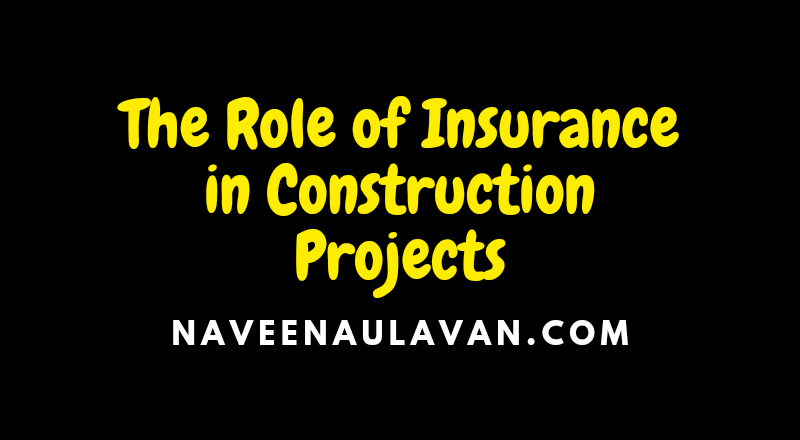Construction projects are highly complex and involve various risks and uncertainties. From design and planning to construction and completion numerous factors can impact the successful delivery of a project. These risks can result in significant financial losses delays and even potential legal disputes. To mitigate these risks and provide a safety net insurance plays a crucial role in construction projects. This article explores the importance of insurance and its different types in the construction industry.
The Need for Insurance in Construction
Construction projects involve significant investments both in terms of finances and time. With such high stakes it is essential to have the right insurance coverage to protect the project stakeholders from potential liabilities and losses. Here are some key reasons why insurance is necessary in construction projects:
1. Risk Transfer
Insurance allows for the transfer of risks from the project owner contractor and other stakeholders to the insurance company. This transfer of risk helps in managing and minimizing financial losses caused by unforeseen events accidents or damages during the construction process. By transferring the risks the burden of the potential cost is shifted to the insurer providing financial protection to the parties involved.
2. Financial Protection
Construction projects involve various parties with financial interests including project owners contractors subcontractors suppliers and lenders. Insurance provides financial protection to all these stakeholders in case of accidents property damage injuries or delays. This protection ensures that the parties can recover their losses and continue with the project without severe financial setbacks.
3. Legal Requirements
Insurance coverage is often a legal requirement for construction projects. In many jurisdictions contractors and construction professionals must carry specific types of insurance such as public liability insurance and workers’ compensation insurance. These legal requirements help safeguard the interests of the workers property owners and the general public.
4. Project Financing
Lenders and financial institutions often require construction projects to have appropriate insurance coverage as a prerequisite for providing loans and project financing. This requirement ensures that the project and its stakeholders are protected against unforeseen events or circumstances that may jeopardize the completion of the project.
Types of Insurance in Construction
Insurance in the construction industry comes in various forms each addressing specific risks and providing coverage for different parties involved in the project. Some common types of insurance in construction include:
1. Builder’s Risk Insurance
Builder’s Risk Insurance also known as course of construction insurance provides coverage for property damage or loss during the construction process. It typically covers the physical structure materials equipment and temporary structures on the construction site. This insurance ensures that the project owner contractors and subcontractors are protected from financial losses caused by events like fire theft vandalism or natural disasters.
2. Public Liability Insurance
Public Liability Insurance is crucial for construction projects as it provides coverage for third-party bodily injury or property damage claims. It protects the project stakeholders from potential liabilities arising out of accidents or damages caused to the public or neighboring properties. This insurance coverage is often mandated by law and helps protect against legal expenses and compensation claims.
3. Professional Indemnity Insurance
Professional Indemnity Insurance is essential for architects engineers and other professionals involved in the design and planning of the project. It protects them against claims of negligence errors or omissions in their professional services. This insurance coverage ensures that professionals can bear the cost of legal defense and potential settlements if they are held liable for damages or losses due to professional negligence.
4. Workers’ Compensation Insurance
Workers’ Compensation Insurance is a legal requirement in most jurisdictions and covers medical expenses lost wages and rehabilitation costs for employees injured on the job. Construction sites are known for their inherent risks and this insurance protects workers from the financial burden of injuries sustained during construction activities. It also ensures that employers can meet their obligations in case of workplace accidents or injuries.
5. Environmental Liability Insurance
Environmental Liability Insurance provides coverage for pollution incidents or accidental releases of hazardous substances during construction. As construction projects often involve excavation demolition and hazardous materials handling there is a risk of environmental damage. This insurance protects against potential legal liabilities cleanup costs and fines associated with environmental contamination.
Conclusion
Insurance plays a vital role in mitigating risks and providing a safety net for the stakeholders involved in construction projects. From property damage and injuries to legal liabilities and financial losses various risks can impact the successful completion of a construction project. By having the right insurance coverage project owners contractors and professionals can safeguard their finances and protect themselves from unforeseen circumstances. The different types of insurance available in the construction industry cater to specific risks and ensure that all parties are adequately protected throughout the project lifecycle.
